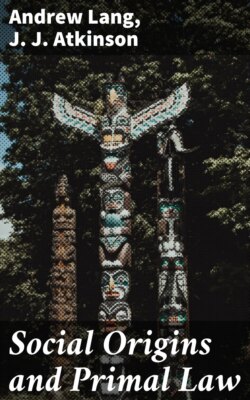Читать книгу Social Origins and Primal Law - Andrew Lang - Страница 18
На сайте Литреса книга снята с продажи.
Оглавление[13] Early History of Institutions, pp. 310, 311.
[14] Westermarck, History of Human Marriage, pp. 53–57.
[15] Mr. John Mathew declares that 'jealousy is a powerful passion with most aboriginal husbands' in Australia. Messrs. Spencer and Gillen, on the other hand, represent the aboriginal husband as one of the most complacent of his species, jealousy being regarded as 'churlish.' Messrs. Spencer and Gillen are decidedly the better authorities. Mathew, Jour. Roy. Soc. N.S.W., xxiii. 404. Westermarck, p. 57. Native Tribes of Central Australia, p. 99.
[16] Studies in Ancient History, 1876, p. 41.
[17] The late Major Powell, of the American Bureau of Ethnology, used gens of a totem kin with descent in the male line, clan of such a kin with descent in the female line, and his school follows him. Mr. Howitt, on the other hand, uses 'horde' for a local community with female, 'clan' for a local community with male descent.
[18] 'The Seri Indians,' by W. J. McGee. Report of Bureau of American Ethnology, Washington, 1898.
[19] 'Siouan Sociology,' Report of American Ethnological Bureau, 1897, p. 213.
[20] Studies in Ancient History, second series, p. 265.
[21] Studies in Ancient History, second series, p. 46. In an appendix to Mr. Morgan's Ancient Society, Mr. McLennan's terms are severely criticised.
[22] I shall call each set indicated by a totem name a 'totem group,' if the members live together; a 'totem kin,' if they are scattered through the tribe.
[23] The Patriarchal Theory, pp. 6, 7, 1885.
[24] Meaning by Exogamy, not a mere tendency to marry out of the group, but a customary law with a religious sanction.
[25] Here the unusual case of the Arunta offers an exception to the rule; a point to be discussed later.
[26] Spencer and Gillen, pp. 8–10.
[27] Ibid. pp. 8–9.
[28] 'Remarks on Totemism,' Jour. Anthrop. Inst., August, November, 1898.
[29] Kinship in Early Arabia, p. 187.
[30] But, as Dr. Durkheim says, man and wife might soon abandon each other, if familiarity breeds contempt.
[31] Journal of the Anthropological Institute, May, 1895, p. 444.
[32] Kamilaroi and Kurnai, p. 132. 1880.
[33] Spencer and Gillen, p. 70. Frazer, Fortnightly Review, April, May, 1899.
[34] The Mystic Rose, p. 460.
[35] History of Human Marriage, pp. 105–113.
[36] Tylor, J. A. I. xviii. 3, 254.
[37] The practice however, is attributed to tame canary birds.
[38] Studies in Ancient History, second series, pp. 57–65.
[39] Cf. Custom and Myth (A. L.), p. 258.
[40] Mystic Rose, p. 31.
[41] Spencer and Gillen, pp. 92–93.
[42] Lord Avebury's view that the 'rite' implies compensation to the other males of the community will be considered later.
[43] Westermarck, p. 13. Citing Brehm, 'Thierleben,' i. 97, Proceedings R.G.S. xvi. 177.
[44] Mystic Rose, p. 443.
[45] Westermarck, p. 292.
[46] Mystic Rose, p. 222.
[47] Kinship and Marriage in Early Arabia, p. 170.
[48] Proc. Roy. Soc. N.S.W. xxxi. 166.
[49] Kamilaroi and Kurnai, pp. 42,46, 47, 115.
[50] Mystic Rose, p. 443.
[51] See Studies in Ancient History, pp. 183–186.
[52] This is the view of Dr. Durkheim, who explains the blood superstition. Cf. Reinach, L'Anthropologie, x. 652.
[53] History of Human Marriage, p. 352.
[54] Compare Mr. Crawley, Mystic Rose, pp. 444–446.
